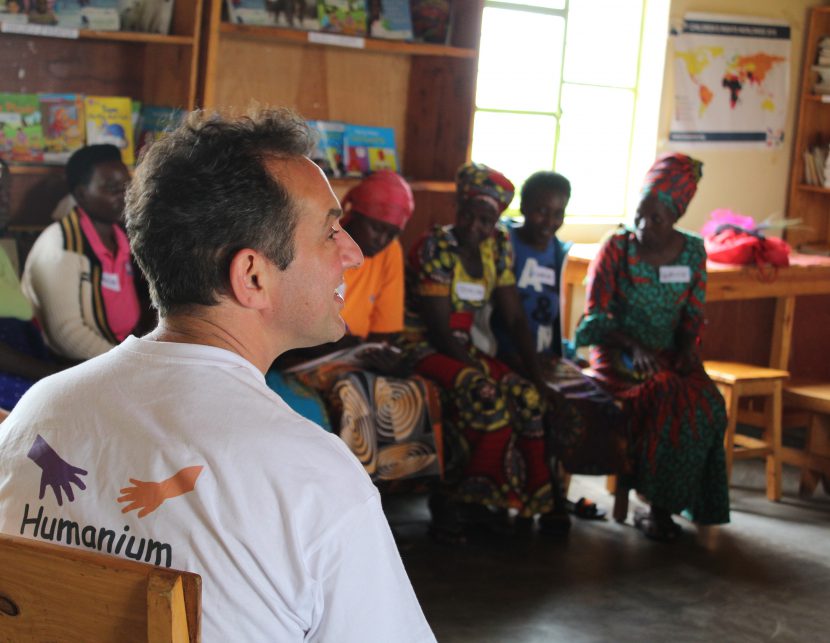An interview with Humanium CEO Arndt Soret on the 10th February 2019
Question: Hi Arndt, it is great that you found time to talk to us on the phone. Where are you exactly?
I’m at Zürich Airport. Today we are starting a two week ‘camp’ in Rwanda. I’m very excited, I feel like a child! Next week we are meeting our colleagues at the German embassy in Rwanda, to present the project report.
So Rwanda remains a focal point for your work?
Yes, Rwanda and India. 2019 is divided in two for our activities. We have organisational operations in and for regions themselves (so called “in the field operations”). 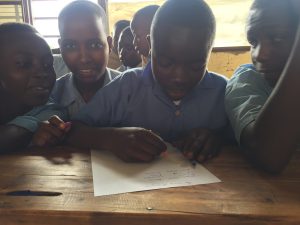 In Rwanda we continue to concentrate on avoiding violence. In 2019 we are going to visit all five regions we are active in. This is to remain close to the development of the young adults and children that we have known and worked with since 2015.
In Rwanda we continue to concentrate on avoiding violence. In 2019 we are going to visit all five regions we are active in. This is to remain close to the development of the young adults and children that we have known and worked with since 2015.
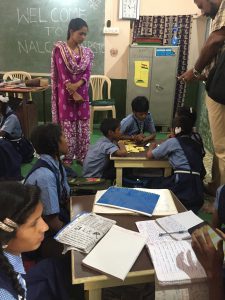 This year in India we expect to open a boarding school for girls, depending on fundraising. It will be in the Madhya Pradesh region, where we will be active for the first time. In India, our focus is on eradicating child labor. We can achieve so much there. The region is very poor. Many children are forced into the production of cheap clothing that we, here in the rich Northern hemisphere, wear. If children are going to school, they can’t go to work. And so the positive spiral grows: Education grows prosperity and therefore the next generation doesn’t have to work.
This year in India we expect to open a boarding school for girls, depending on fundraising. It will be in the Madhya Pradesh region, where we will be active for the first time. In India, our focus is on eradicating child labor. We can achieve so much there. The region is very poor. Many children are forced into the production of cheap clothing that we, here in the rich Northern hemisphere, wear. If children are going to school, they can’t go to work. And so the positive spiral grows: Education grows prosperity and therefore the next generation doesn’t have to work.
And what do you have planned organizationally?
Loads. In 2019, we are going to further develop the next stage of our Coaching Method. The cooperation and feedback from life-coaches in the region gives new impetus to the graduate psychologists here in Geneva.
Furthermore we aim to include our investors and donors further into the Humanium community. I am really excited about this! Everyone who participates in our project should hear and we what are doing. For this we are going to arrange so-called “e-teas” on a monthly basis. A further aim is to build our contact with the UN.
Differently to other children’s rights organizations, you concentrate your field work on two countries. Why is that?
To us it is obvious that children’s rights should be defended everywhere in the world. That’s why our helpline is always open for everyone. In this way we are in contact with people from Uganda, South America and France. Incidentally, A further important goal for 2019 is to improve our helpline, by providing permanent staff.
But Humanium is a small organisation and developing such structures is difficult. It is a lot of work to find local partners to work with in a country. And without these partners – such as AVSI (Associazione Volontari per il Servizio Internazionale) in Rwanda and Hand in Hand in India – it wouldn’t be possible. Therefore solutions to problems are offered up on a silver platter. When we are in regions where we can get a sense of where help is needed and through close contact with local organisations, we can develop project ideas.
I can imagine the value of this very well. Is it perhaps difficult for you to see where help could be needed and this is therefore why you concentrate on just a few projects.
Yes that’s just the case. However, we don’t just just arrive with bulging sacks and then disappear again. The Humanium effect is that we help communities so that eventually they can help themselves.
The children and young adults that we work with are better prepared for the future. We give them resilience, stamina and a new community to hold onto. We are the fertilizer that falls to the floor and allows permanent structures to grow. We do this in Rwanda with our coaching and in India through our education projects.
Through the coaching in Rwanda, you prevented the continuation of the spiral of violence that led to the genocide.
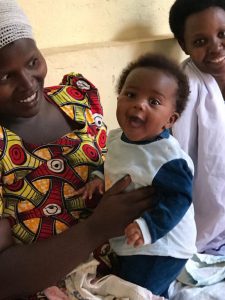 Exactly. Violence is ever present in Rwanda. The children that had to the watch the murder of their parents, are now young adults, and themselves have children to whom they pass on this trauma. This spiral can and will be broken through our coaching initiative. We work with both groups, children and adults, to show them that there are alternatives to violence. My second concern in Rwanda is the many pregnancies of young girls – some as young as 14 years old – and how this has traditionally resulted in them being cast out by their families.
Exactly. Violence is ever present in Rwanda. The children that had to the watch the murder of their parents, are now young adults, and themselves have children to whom they pass on this trauma. This spiral can and will be broken through our coaching initiative. We work with both groups, children and adults, to show them that there are alternatives to violence. My second concern in Rwanda is the many pregnancies of young girls – some as young as 14 years old – and how this has traditionally resulted in them being cast out by their families.
Girls fall pregnant and are left to deal with it alone?
Yes, in Rwanda we hear the same unyielding attitude that we unfortunately hear so often in Europe. That “they only have themselves to blame”. That makes me so mad. And what makes me even more angry is that often it is the fathers who are taking out their own impotence and traumatization on their daughters. The consequence of this is that the girls are stigmatized and unable to live a normal life, with their families and unable to get married. All because of their fathers. Terrible isn’t it? We work with these girls, and offer them a kind of substitute family through the communities that are developed in the coaching workshops. And naturally we – and our local partners – talk with the families to try and achieve an understanding.
Does this work?
Believe me Andrea, when I meet with the fathers, it works. I can be very convincing when I am angry.
What is your goal in Rwanda?
We want to create real, motivational perceptions of the future for the children. A future is possible, with jobs, and a country that doesn’t have to depend upon help from others. Where children’s rights are accepted and global cooperation is respected, for example in matters of climate protection. Children should grow up without having to think about leaving their country in order to live a good life. This goes for Rwanda as much as it does to our projects in India.
In India, have you got plans for your education structure?
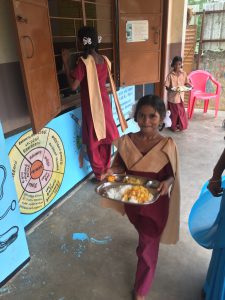 That’s right! We have already founded some school with our partner ‘Hand-in-Hand’, mostly in the Tamil Nadu province. With these schools we cater for older children who until now have been isolated from education, can acquire more knowledge in a shorter time so that by 14 years old they can access free public school. We offer them a door onto education, which is the key to a future, resulting in prosperity, sinking birth rates and starts a spiral in the right direction.
That’s right! We have already founded some school with our partner ‘Hand-in-Hand’, mostly in the Tamil Nadu province. With these schools we cater for older children who until now have been isolated from education, can acquire more knowledge in a shorter time so that by 14 years old they can access free public school. We offer them a door onto education, which is the key to a future, resulting in prosperity, sinking birth rates and starts a spiral in the right direction.
One of the best examples of what education can achieve is this: When a woman in India can sign for a microcredit with a thumb print and is able to put herself through education with the help of this loan. Then two years later she is able to sign for the loan with a signature. This pride and the freedom it allows, demonstrates that we are able to make many things right, even if we can not solve everything.
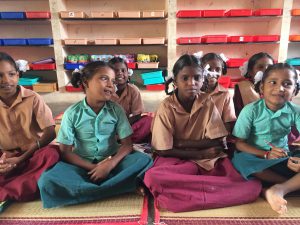
And now a boarding school?
Yes, often children have to travel two to three hours by bus to come to school. This hurdle is too big for many to overcome. This is why a boarding school, above all a female boarding school helps parent overcome the fear of sexual assault.
On the subject of parents, how do you find them prepared to send their children to the boarding school when they often need them to work?
That is a really important aspect. We often hear: We need something to eat now! Our children have to work! Education is a long term investment. The thing that helps here is persuasion as well as a partner who can work with the parents to find solutions. This is why we are so pleased to have Hand-in-Hand as a local partner. They are tireless in this area, talking with parents, explaining the opportunities open to them and their children and what going to school offers. The problem is never the children, it’s the parents who need to be motivated. We arrange children’s rights workshops with them for example, and it is great to see how we can motivate and inspire disillusioned people.
You have spoken so often about the work of your local partners, what exactly is the role of Humanium?
Humanium is a megaphone for local organizations. We tie together important contacts in the government, take care of licenses, advertise in the region and in Switzerland to develop projects. Our life-coaches bring alternative views and expertise to the game. Naturally we take care of fundraising in Germany, France and in Switzerland. We are sparring partners for locals and a gateway to the world.
But what is so important is that the teamwork isn’t one sided, in that sense that we give and they take. There is a reciprocal relationship with the local organizations and us when it comes to sharing wisdom.
In this way the humanitarian maxim of the rich North preaching to the poor South is shown to be outdated. The reality is what we work together and learn from each other. We can learn so much from people in Africa and India from their authentic feelings, their physicality and their connection to nature. They have helped us so much in this area. We here in the North lack this connection and I believe that this is significant because illnesses such as depression and burn-out take over in the ‘rich’ North. This disconnect means we lack respect for nature and the environment. And we have lost our connection to it.
For me this holistic aspect is what makes Humanium’s methods, do you see that too?
Yes, naturally. We are always in the thick of it, with everything we do. When we are invited – which we often are – we go dancing with the locals who come to our workshops. This makes a lasting impression and it as an experience we share with our contributors. I believe, and so do many of our investors, that our methods are unique: Humanium is intuitive, humane, personal, emotional and it can move people to tears.
Thank you so much Arndt, for your insight and openness. I wish you all luck and every success for your plans in 2019. But firstly, Have a good flight!
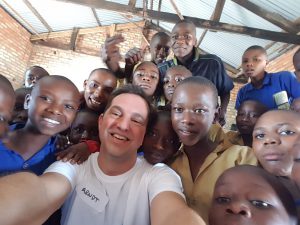
Interview by Andrea Goffart
Translated by Jacob Davies
Proofread by Charlotte Madrangeas

